- 3003 Aluminum Coil Advantages
- 3003 Aluminum Coil Standards
- Equivalents of AA 3003
- 3003 Aluminum Coil Performance
- Typical 3003 Aluminum Coil
- 3003 Aluminum Coil Mechanical Property Limits
- What are Common Industries that use 3003 Aluminum Coil?
- Key 3003 Aluminum Coil Introduction
- Chemical Composition of 3003 Aluminum Coil
- More Information about Aluminum Coil 3003
- 3003 Aluminum Coil Limitations
- Frequently Asked Questions (FAQs) about 3003 Aluminum Coil
3003 aluminum coil is an aluminum alloy with manganese and copper as the main alloying elements. It is commonly used in applications such as building facades, roofing and siding, as well as in the production of cookers, heat exchangers and other industrial equipment.
Compared with other aluminum alloys, 3003 aluminum coil has good formability, excellent corrosion resistance, and is easy to weld. Its moderate strength and good machinability make it a popular choice for a variety of applications. It is also commonly used in chemical equipment, storage tanks and pressure vessels due to its corrosion resistance properties.
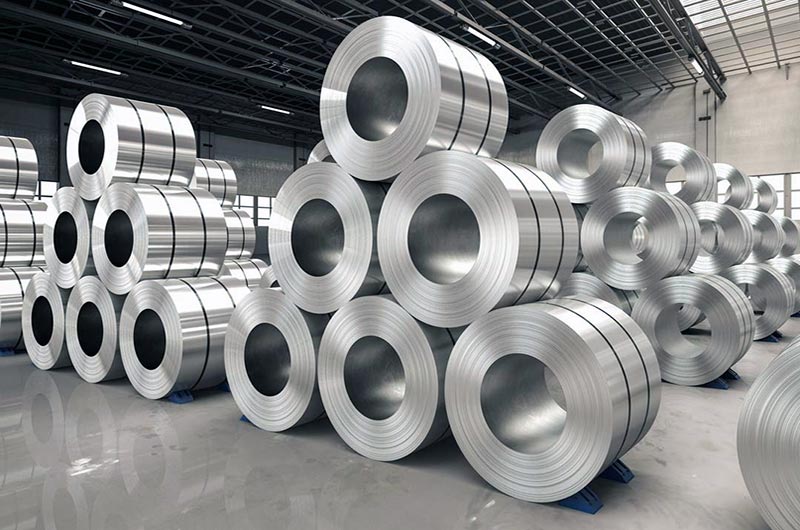
Finishing options for 3003 aluminum coils include anodized, painted, and coated. These treatments can improve the appearance, corrosion resistance and durability of aluminum coils, making them more suitable for specific applications.
3003 Aluminum Coil Advantages
- Good weldability
- Good corrosion resistance
- Good formability
- Medium strength
- Good rust resistance
- Good plasticity
3003 Aluminum Coil Standards
- ASTM-B209
- EN-AW 3003/AlMN1Cu
- UNS A93003
- QQA 250/2
Equivalents of AA 3003
UNS A93003, ISO AlMn1Cu, Aluminium 3003, AA3003, Al3003
3003 Aluminum Coil Performance
- 1. Higher strength than 1100, smooth surface, plasticity, and pressure resistance.
- 2. The preferred sheet material for power battery shell, with impact resistance, not easy to break and leak, meeting the strength and rigidity requirements of power battery shell.
Typical 3003 Aluminum Coil
3003 H24 Aluminum Coil
H24 is a strain-hardened temper designation, which means the aluminum coil has undergone a strain-hardening process to improve its strength.
3003 H24 Aluminum Coil has moderate strength and is commonly used in applications where some level of hardness and strength is required, but it still needs to be easily formable.
Typical applications for 3003 H24 aluminum include roofing, siding, and sheet metal work in construction.
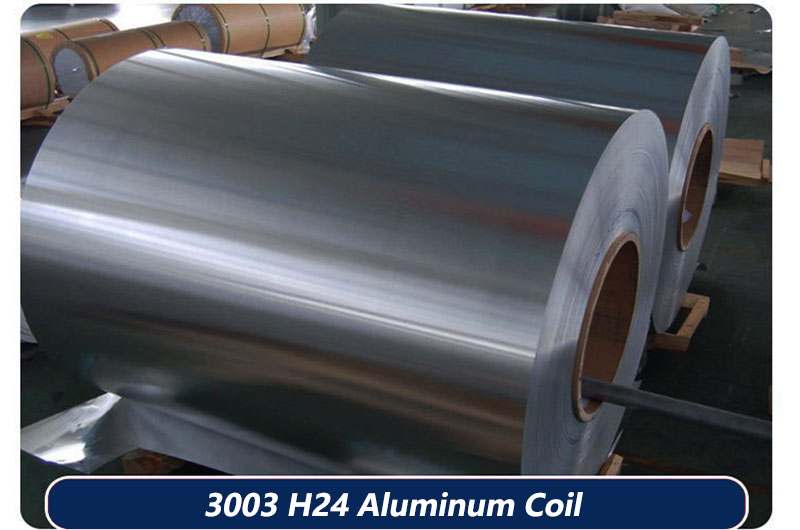
3003 H19 Aluminum Coil
H19 is also a strain-hardened temper designation, indicating that the aluminum coil has undergone a similar strain-hardening process as H24.
3003 H19 offers even higher strength compared to H24, making it suitable for applications requiring greater mechanical strength.
3003 H19 Aluminum Coil is used in applications such as the production of containers and packaging materials.
3003 H14 Aluminum Coil
H14 is a temper designation that indicates the aluminum coil has been strain-hardened to a lesser degree compared to H24 or H19.
3003 H14 Aluminum Coil provides good formability and is often used in applications where forming and bending are key requirements.
3003 H14 is commonly used in the manufacture of heat exchanger fins, cooking utensils, and general sheet metal work.
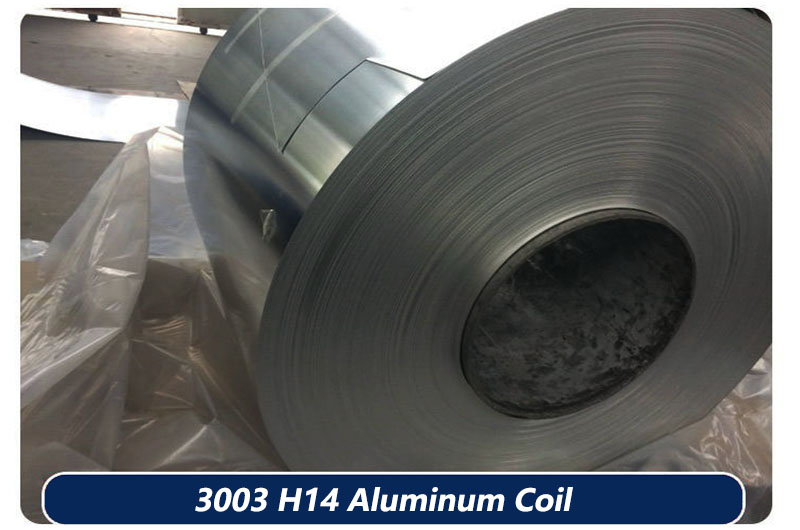
In summary, the choice between 3003 H24, H19, or H14 aluminum coils depends on the specific mechanical properties and formability needed for a given application. H24 and H19 offer higher strength, while H14 provides good formability with a balance of strength. The selection of the appropriate temper designation should align with the requirements of the intended use.
3003 Aluminum Coil Mechanical Property Limits
| Temper | Specified Thickness(in) | Tensile Strength - KSI | Elongationin 2 inches % | |||
| Ultimate | Yield | |||||
| Min | Max | Min | Max | |||
| H12 | 0.017 - 0.019 | 17 | 23 | 12 | - | 3 |
| H12 | 0.020 - 0.031 | 17 | 23 | 12 | - | 4 |
| H12 | 0.032 - 0.050 | 17 | 23 | 12 | - | 5 |
| H12 | 0.051 - 0.113 | 17 | 23 | 12 | - | 6 |
| H12 | 0.114 - 0.161 | 17 | 23 | 12 | - | 7 |
| H12 | 0.162 - 0.249 | 17 | 23 | 12 | - | 8 |
| H14 | 0.009 - 0.012 | 20 | 26 | 17 | - | 1 |
| H14 | 0.013 - 0.019 | 20 | 26 | 17 | - | 2 |
| H14 | 0.020 - 0.031 | 20 | 26 | 17 | - | 3 |
| H14 | 0.032 - 0.050 | 20 | 26 | 17 | - | 4 |
| H14 | 0.051 - 0.113 | 20 | 26 | 17 | - | 5 |
| H14 | 0.114 - 0.161 | 20 | 26 | 17 | - | 6 |
| H14 | 0.162 - 0.249 | 20 | 26 | 17 | - | 7 |
| H16 | 0.006 - 0.019 | 24 | 30 | 21 | - | 1 |
| H16 | 0.020 - 0.031 | 24 | 30 | 21 | - | 2 |
| H16 | 0.032 - 0.050 | 24 | 30 | 21 | - | 3 |
| H16 | 0.051 - 0.162 | 24 | 30 | 21 | - | 4 |
| H18 | 0.006 - 0.019 | 27 | - | 24 | - | 1 |
| H18 | 0.020 - 0.031 | 27 | - | 24 | - | 2 |
| H18 | 0.032 - 0.050 | 27 | - | 24 | - | 3 |
| H18 | 0.051 - 0.128 | 27 | - | 24 | - | 4 |
| H19 | 0.006 - 0.063 | 29 | - | - | - | 1 |
| O | 0.006 - 0.007 | 14 | 19 | 5 | - | 14 |
| O | 0.008 - 0.012 | 14 | 19 | 5 | - | 18 |
| O | 0.013 - 0.031 | 14 | 19 | 5 | - | 20 |
| O | 0.032 - 0.050 | 14 | 19 | 5 | - | 23 |
| O | 0.051 - 0.249 | 14 | 19 | 5 | - | 25 |
What are Common Industries that use 3003 Aluminum Coil?
Industries that commonly use 3003 aluminum include construction (roofing, siding), automotive (heat exchanger fins), food packaging (cans), and the manufacture of household items (cookware).
| State | Performance Characteristics | Main Applications |
|---|---|---|
| H14/16/H18/H22/H24/H26 | Good formability, moderate strength, high corrosion resistance | Building facades, roofing, siding, cooking utensils, heat exchangers, chemical equipment |
| O | Excellent formability, low strength, high corrosion resistance | Heat exchangers, storage tanks, pressure vessels |
| Application | State/Condition | Examples |
|---|---|---|
| Building facades | H14, H16, H18, H22, H24, H26 | Curtain walls, decorative panels, exterior cladding |
| Roofing | H14, H16, H18, H22, H24, H26 | Corrugated roofing, standing seam roofing |
| Siding | H14, H16, H18, H22, H24, H26 | Vinyl-coated aluminum siding, seamless aluminum siding |
| Cooking utensils | H14, H16, H18, H22, H24, H26 | Pots, pans, baking sheets, cookware sets |
| Heat exchangers | H14, H16, H18, H22, H24, H26, O | Radiators, air conditioning evaporators, automotive heat exchangers |
| Chemical equipment | H14, H16, H18, H22, H24, H26, O | Storage tanks, pressure vessels, chemical piping |
| Packaging | H14, H16, H18, H22, H24, H26 | Food containers, beverage cans, pharmaceutical packaging |
| Electronic casings | H14, H16, H18, H22, H24, H26 | Mobile phone casings, laptop casings, electronic device covers |
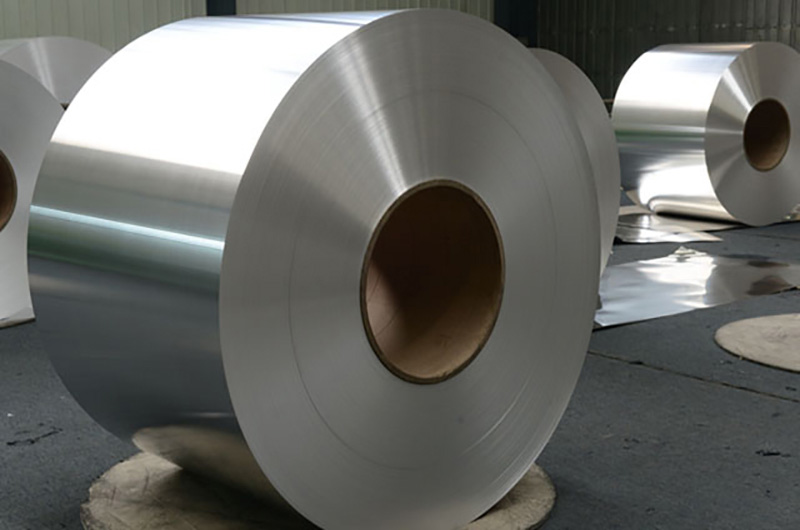
Key 3003 Aluminum Coil Introduction
3003 Aluminum Coil for Cooling Fin Stock
Heat dissipation fins are an important component used to improve the heat dissipation effect of mechanical equipment, electronic appliances and other fields. The heat dissipation capability is mainly improved by increasing the heat dissipation surface area. 3003 aluminum coil is a commonly used cooling fin material because of its good thermal conductivity, machinability and corrosion resistance.
3003 aluminum coils are used for the manufacture of heat dissipation fins, and generally require special processing techniques, such as stamping, forming, bending, etc., to produce fins with a certain shape and size. At the same time, the 3003 aluminum coil can also improve its surface roughness and corrosion resistance through surface treatment, and further improve the heat dissipation effect and service life.
3003 Aluminum Coil Pipe Insulation
3003 aluminum coils can be used as pipe insulation materials. It is mostly used in chemical factories, and its anti-rust function is better than that of 1-series aluminum coils.
During pipeline transportation, in order to reduce energy loss and protect pipelines, it is usually necessary to insulate pipelines. The 3003 aluminum coil is a commonly used pipeline insulation material because of its excellent corrosion resistance, oxidation resistance, formability and good thermal conductivity.
3003 aluminum coils are used for pipe insulation. Generally, it is necessary to use the coiling method to make aluminum coils into aluminum coils of certain specifications and sizes, and then make the aluminum coils into pipe insulation materials through forming, crimping and other processing processes. In this way, the insulation performance and service life of the pipeline can be effectively improved.
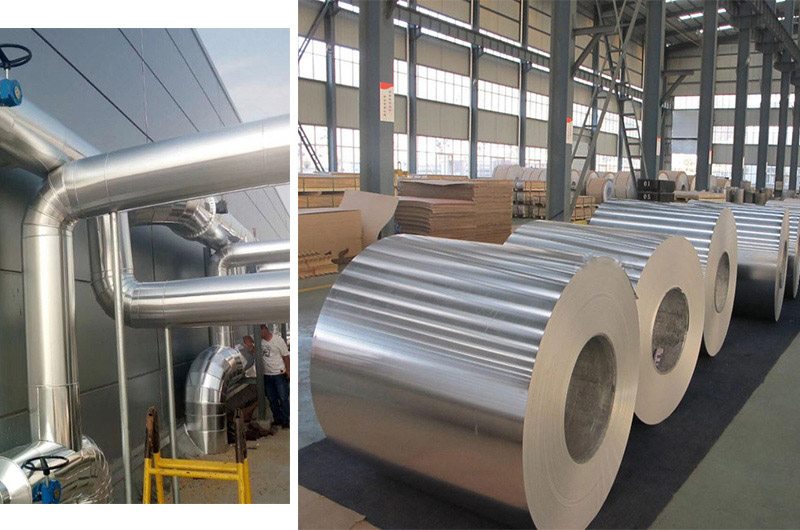
3003 Aluminum Coil Battery Case
As an aluminum alloy material with good weldability and formability, 3003 aluminum coil can achieve certain anti-corrosion performance and electrical insulation performance after special treatment on the surface, which is very suitable for the manufacture of battery shells.
The 3003 aluminum coil also has the characteristics of light weight, which can effectively reduce the overall weight of the battery and improve the energy density and service life of the battery.
New energy vehicle power battery shells, top plates, and separators can be stamped into square or round battery shells.
This aluminum coil is widely used in construction, aviation, automobile, electronics, home appliances and other fields. Among them, architectural applications include roofs, exterior wall panels, door and window frames, etc.; aviation applications include aircraft shells, wings, etc.; automotive applications include body panels, door panels, etc.; electronic applications include computer casings, mobile phones, etc. Shells, etc.; applications in home appliances include refrigerators, washing machine shells, etc.
Water Cooling Plate
3003 mod aluminum plate, 3003*4343/3003*4045 aluminum plate can be used for new energy vehicle power battery brazing water cooling plate or condensation/radiation equipment.
The water-cooled plate is an important component for heat dissipation, and is usually used in electronic appliances, optical instruments, mechanical equipment and other fields. The manufacture of water-cooled plates requires its materials to have good thermal conductivity, machinability, corrosion resistance, and dimensional stability. The 3003 aluminum coil just has these characteristics, so it has become a commonly used water-cooled plate material.
3003 aluminum coils are used in the manufacture of water-cooled plates, and generally require special treatment on the surface, such as sandblasting, anodizing, etc., to increase their surface roughness and corrosion resistance, thereby improving the heat dissipation effect and service life of the water-cooled plate.
3003 aluminum coils can be processed by bending, cutting, welding and other processes, and water-cooled plates of different shapes and sizes can be manufactured to meet the requirements of different fields and needs
Chemical Composition of 3003 Aluminum Coil
| Composition | Si | Fe | Cu | Mn | Mg | Cr | Zn | Ti | Others-Each | Others Total | Al Min |
| 3003 | 0.6 | 0.7 | 0.05-0.20 | 1.0-1.5 | – | – | – | – | 0.05 | 0.15 | Remainder |
More Information about Aluminum Coil 3003
- 1. Processing: Aluminum Coil 3003 has good processability for an aluminum alloy.
- 2. Heat Treatment: 3003 Aluminum Coil cannot be heat treated.
- 3. Welding: This alloy has good weldability and is sometimes used with other aluminum alloys.
3003 Aluminum Coil Limitations
- 1. Not heat treatable
- 2. Low ductility
Frequently Asked Questions (FAQs) about 3003 Aluminum Coil
Is 3003 Aluminum Suitable for Outdoor Applications?
3003 aluminum has good corrosion resistance but may not be ideal for prolonged exposure to harsh outdoor environments. For outdoor applications, it's often coated or painted to enhance its durability.
What are some Alternatives to 3003 Aluminum for Similar Applications?
Other aluminum alloys, such as 5052 and 6061, may be used as alternatives, depending on specific performance requirements. For increased corrosion resistance, 3004 or 5005 aluminum alloys can be considered.
Can 3003 Aluminum be Painted or Coated?
Yes, 3003 aluminum can be painted or coated to enhance its appearance and improve corrosion resistance. Proper surface preparation is essential for adhesion of coatings.
Can 3003 Aluminum be Welded?
Yes, 3003 aluminum is weldable using various welding techniques, including MIG and TIG welding. Proper cleaning and preparation are important to achieve good welds.
